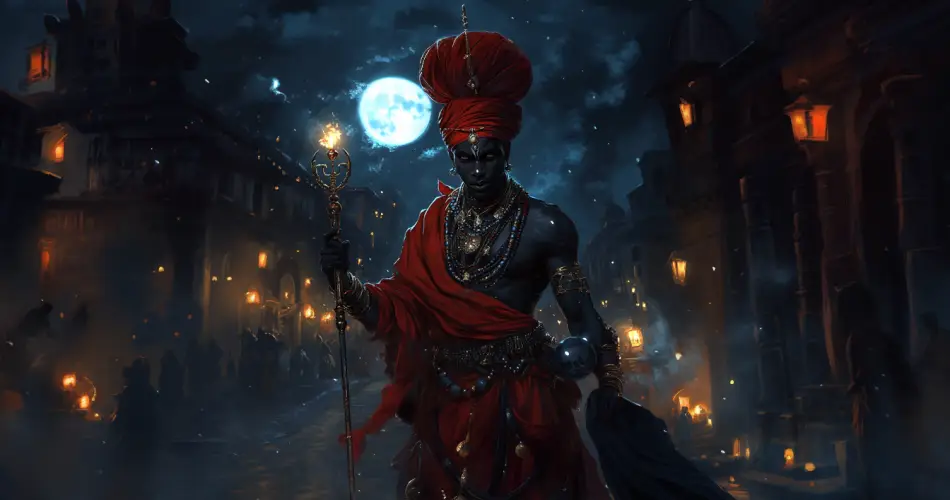Orisha Elegua is a central figure in Yoruba spirituality. He is known as the guardian of crossroads and the opener of paths to those who seek him.
He serves as a messenger between the human world and the divine. Elegua also plays a major role in influencing decisions and the fate of mortals.
Understanding Elegua’s role provides deep insights into Yoruba culture and its impact on spiritual practices worldwide.
This article provides a comprehensive summary of everything you need to know about this ancient deity.
Who is Orisha Elegua?
Elegua, who is also known as Elegba or Esu-Elegbara, is a deity whose origin can be traced back to the Yoruba people of West Africa.
Known as the divine guardian of crossroads, he oversees the intersection of the physical and spiritual realms and carries messages between these two places.
In popular culture, Elegua is often depicted as a young boy in black and white clothing. He is seen as a mischievous and somewhat silly character that loves to play tricks on people.
However, the Yoruba believe that Elegua has 256 different paths. These paths represent Elegua’s different avatars and the various ways a person can encounter him.
Elegua does not only deal with humans; he is also an important deity to the gods. In any spiritual activity, Eelegua is always honoured first, as it is impossible for prayers and offerings to reach the gods without his blessings.
What is Elegua Used For?

As you might have guessed, Elegua is the ultimate embodiment of choices and decision-making. As the god of crossroads, he already knows every possible outcome of any decision.
The Yoruba believe that a quick prayer to this deity will help guide a person to make good decisions that will lead to positive outcomes.
Orisha Elegua can influence a person’s life by removing major obstacles that hinder progress. He can also mischievously place these obstacles in our paths to teach valuable lessons.
At those moments when you are unsure of what to do, Elegua is the guide that either illuminates the best direction for you or places a minor challenge on your path that will eventually help you to see and understand what is best for you.
Elegua also serves as a messenger to the Orishas. When mortals pray to the gods and ancestors, it is Elegua’s duty to carry these messages. People who do not pay proper respect to him find their prayers unanswered.
Read Also: How are Orisha’s formed
The Relationship Between Elegua and Eshu
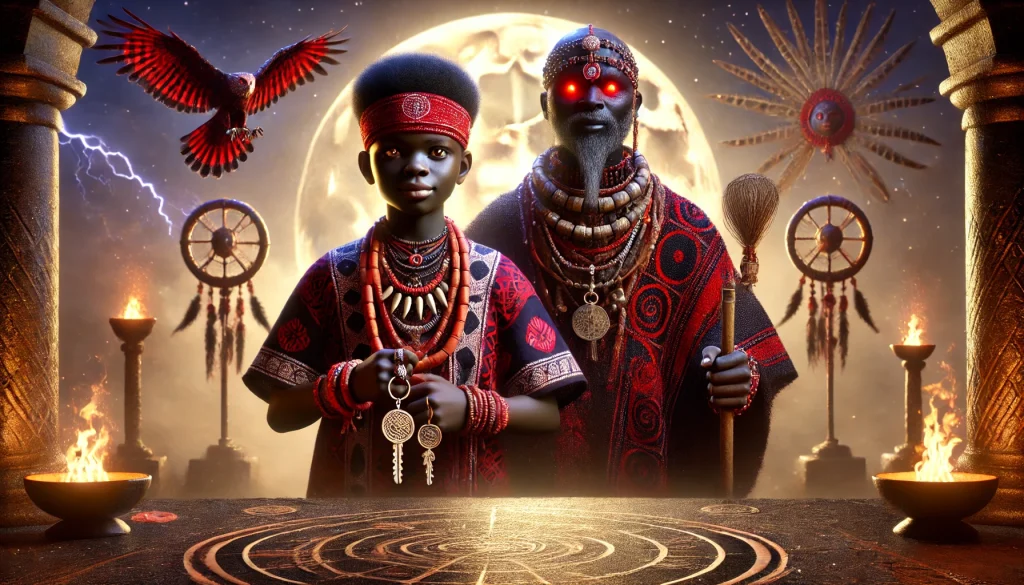
In the Yoruba Pantheon, Eshu is a deity that is closely related to Elegua. Elso is also a trickster god; however, he is the more aggressive version of Elegua.
While elegua teases with harmless tricks, Eshu’s pranks are more forceful and deadly. It is said that Eshu introduces chaos and accidents into the lives of humans.
Eshu is also the chief enforcer of natural and divine laws; thus, any interaction with him should be done with extreme care and caution.
Who is Elegua’s Wife?
Elegua’s marital status is not prominently featured in Yoruba mythology. The lack of information on the wide of Elegua is understandable. Since the deity is portrayed as a child, he is not expected to have any wife and children.
The story is different for Eshu, whose wife is believed to be Abgeru (collector of sacrifice).
It is important to note that this information is heavily disputed, as most Yoruba historians believe that Eshu did not have a wife.
Elegua in Syncretism: Elegua Saint
During the trans-Atlantic trade, the massive movement of Yoruba people from West Africa to Europe and the Americas created a unique blend of Yoruba traditional beliefs with the Christian religion.
Enslaved Africans brought to the Americas were prohibited from practising their traditional religions. They adapted by aligning their deities—the Orishas—with Catholic saints. This blending allowed them to honour their gods covertly under the guise of Christian worship.
Elegua is Synchrtised with the catholic saint Anthony of Padua. The Association of Elegua with the catholic saint is not random.
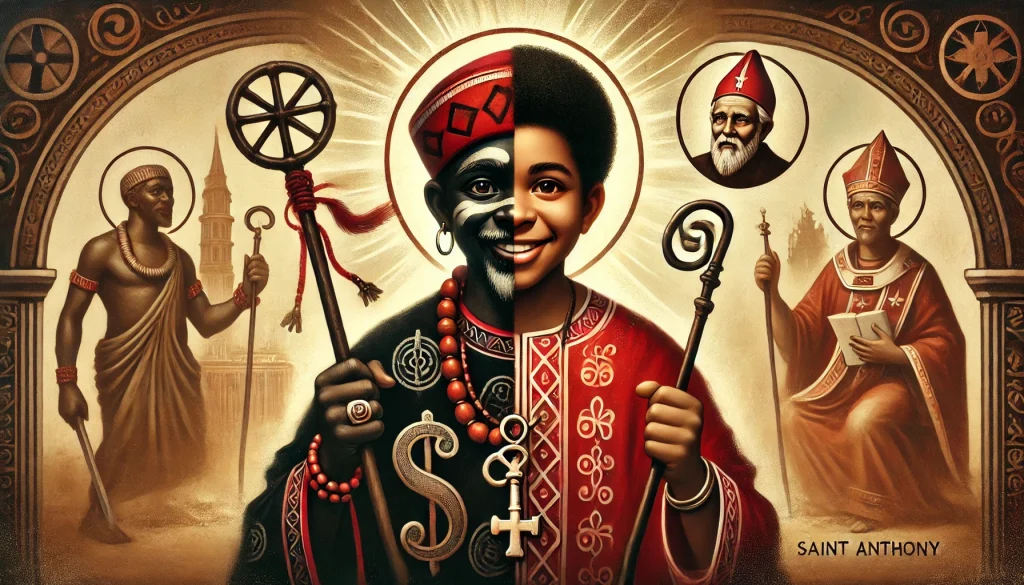
There are similarities between the Yoruba belief in Elegua and the Catholics’ beliefs in Saint Anthoney. These similarities made the Synchretism of Elegua as a saint more natural.
Like Elegua, Saint Anthony is the Catholic patron of lost things and is often prayed to for protection. Anthony is also the patron saint of travellers. This fits perfectly with Elegua’s role as the god of roads and travel.
Offerings for Elegua
Persons who seek the favour or protection of Elegua before making a major decision can do so by making offerings to him. Elegua is particularly delighted with things that will make a child happy.
Common offerings to Elegua include;
- Candies and Sweet
- Toys (like toy cars, balls, or spinning tops)
- Whole Coconuts
- Smoked Fish
- Red Flowers
- Rum
- Candles.
These offerings are typically placed at crossroads, doorways, or dedicated Elegua alter within the home. Before presenting an offering, practitioners light a candle and recite a short prayer to invoke the deity.
Elegua Prayer for Protection
Apart from offerings, practitioners can also recite special prayers to invoke the deity and ask for his help. One popular Elegua prayer for protection goes thus;
“Vital force that Cuts through the Length and breadth appear,
Child who separate fissures and divides our pathways,
Do not cut the flow of Kindness from me.”
This prayer recognizes the power of Elegua to direct a person to where he’ll meet good luck.
Here is another Elegua prayer;
“Elegua, keeper of the crossroads,
I honour your presence.
Protect me from harm and guide me through the paths of life.
Open the doors that lead to goodness and close those that bring negativity.
Ashe.”
Is Elegua Evil?
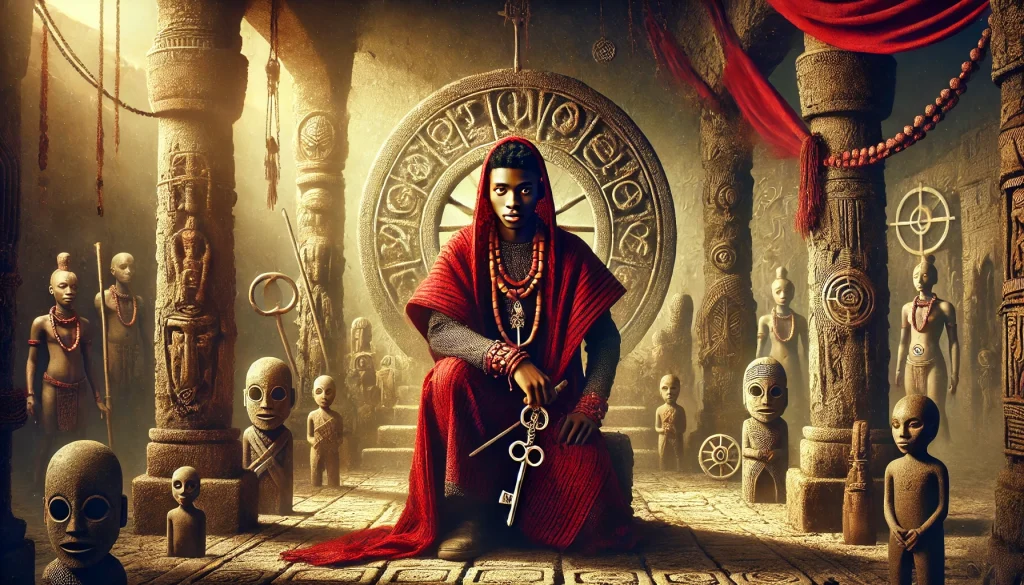
Elegua is not an evil Deity. However, the mischievousness and association of Elegua with the unpredictability that comes with major decisions has caused a lot of misunderstanding about the nature of the deity.
This is the wrong way to look at it. The Yoruba believe that when our decisions lead to an unexpected result, this is Elegua’s way of teaching wisdom and building character. In the end, the lessons we learn in these situations make us stronger and better people.
Elegua represents both the positive and negative aspects of life. Just as he can open doors to new possibilities, he can also close them to prevent harm or to steer us in a more beneficial direction.
This dynamic shows that life’s unpredictability can lead to personal development and should not be feared or considered evil.
Another important thing to note is that the concept of Evil is different in Yoruba tradition. For the Yoruba, Elegua serves as a guide to fulfilling one’s destiny.
Even if his actions seem “evil” at the moment, as long as they build up to the final moment of destiny, they are ultimately good.
Elegua Stories (Pataki)
For the Yoruba, stories are an important part of the worship and adoration of Orishas. The stories of Elegua explain his origin and how he rose to become one of the most important deities in Yoruba and Santeria culture.
Story of Elegua and Olodumare (Olofi)
In one story, Olodumare grew tired and frail from all his work in creating the universe and giving orishas their powers. The orishas were summoned to the great hall of Olodumare and asked to revive the supreme god.
As Olodumare sat slumped on his throne, all the most powerful orishas came one by one and tried their powers without success.
Elegua was in the hall with them, and he asked if he could also try. At this time, Elegua was a child, so he was shunned by the older Orishas.
However, after everybody in the hall had tried without any improvement in Oldumare’s condition, Elegua asked to try again, and this time, his request was granted.
Elegua’s cure
Elegua pulled out three herbs from his bag, placed them in the mouth of the great god and asked him to chew and swallow. Then he took out a feather and moved it over the body of Olodumare.
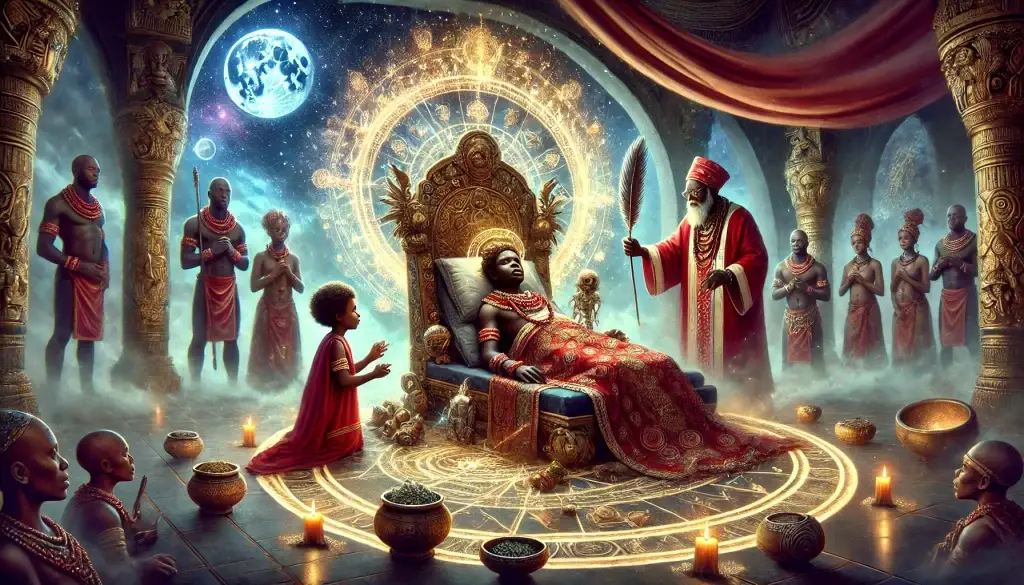
As soon as Elegua completed his treatment, Olodumare felt himself getting stronger. Before Elegua returned to his place in the hall, the supreme god was completely healed.
Impressed, Olodumare called Elegua forward and asked him how he knew what to use. Elegua responded that he had studied every part of the forest and its secrets. He also added that he could have cured Olodumare earlier, but the other Orishas did not allow him.
Olodumare smiled and told Elegua that from this day forward, he would have the power to open all gates, doors and passageways. No one will ever deny him entry again. He also gave Elegua a golden key that could unlock every door in the universe.
Oludumare also announced that Elegua would be his personal messenger. If Elegua was not appeased first, then no orisha would be able to reach his castle.
Finally, Olodumare announced that though Elegua was a child, he would be the first to eat in any ceremony and the first to be prayed to.
Read Also: The rise and fall of Sango
Symbols of Elegua In pictures
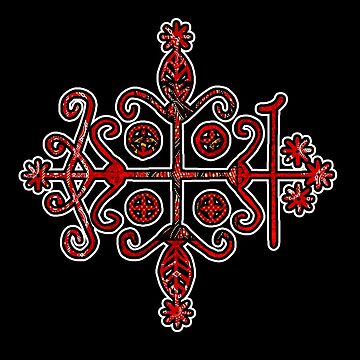
The visual representations of Elegua in pictures are rich with symbolisms that communicate his role in Yoruba spirituality and diaphoric traditions.
Elegua Colours
The main colours associated with Elegua are Red and Black. Black is the colour of the unknown; it represents the mysteries that come with making a major life-changing decision. Black also symbolizes mysteries and the depth of the spiritual realm.
The red colour symbolizes Elegua’s power and energy. It also represents the vitality and life force that propel movement and change.
Keys of Elegua
Most pictures of Elegua show him holding a key. These keys symbolize Elegua’s authority over doors and pathways. With these keys, Elegua can open or close doors in one’s life.
Stones and Rocks
Elegua is sometimes associated with natural elements such as stones and rocks. They are often painted in elegua’s colours and are decorated with cowries.
These sacrad stones serve as Elegua altar and are placed in homes just behind the door. It is believed that this will invoke Elegua to protect the household.
Cultural Impact of Elegua
Elegua has significantly influenced popular culture, particularly in the Americas. This influence can be seen in art, music, films, and literature.
Elegua in Music
The impact of Elegua on music is evident in genres like salsa, afrobeat, jazz, and hip-hop. Many artists with Afro-Carribbean backgrounds, like Celia Cruz, have invoked Elegua in their performances.
Also, music plays an important role in the invocation of Elegua during rituals and sacrifices. Here is one popular Elegua music used to invoke the deity in the Caribbean;
“Ago ago x2,
Ago ago x2,
Ago ile ago x2″
This means;
Open up, open up,
Open up, open up,
Open up, ile, open up.
Elegua in Film and Television

In film and television, Elegua’s pictures and symbolism appear in narratives that explore African spirituality, identity, and magic.
Movies like “Black Orpheus” (1959) and more recent productions like “American Gods” (2017) feature characters influenced by or modelled after Elegua.
In Visual Art
Elegua has inspired visual artists, particularly those working within Afro-Caribbean and African American contexts. Artists like Jean-Michel Basquiat have embedded symbolism related to Elegua in their works, using crossroads, doors, and keys as recurring motifs.
Artistic depictions of Elegua come in the form of sculptures, carvings, and paintings. For practitioners, this artwork serves as a visual interface through which direct communication can be made with Elegua. Sacrifices are often offered to these artistic representations of Elegua.
In Literature
In literature, Elegua appears as a metaphor for change, transition, and choices. Authors like Ntozake Shange and Ishmael Reed have drawn on his figure in their explorations of African heritage, identity, and diaspora.
Fashion and Commercial Influence of Elegua
Elegua’s symbols—keys, cowries, and beaded necklaces—have even found their way into fashion and commercial branding. These symbols are often worn as a sign of goodwill and protection. They are also used in charms or talismans.
Elegua also has his own sigil, which was probably formed as part of his Syncretism with Saint Anthony.
Conclusion
Although he can be a little mischievous, Elegua’s intentions are good. When he is properly venerated with offerings, he grants good luck and removes obstacles from our way.
He serves as a guide that helps us navigate life’s complexities. His presence reminds us that every choice opens a new path filled with opportunities for growth, learning, and transformation.
Ultimately, Elegua resonates with universal themes of choice, destiny, and transformation.
By honouring him, we preserve a rich cultural heritage and engage with timeless lessons that inspire us to forge our own paths with intention and awareness.
